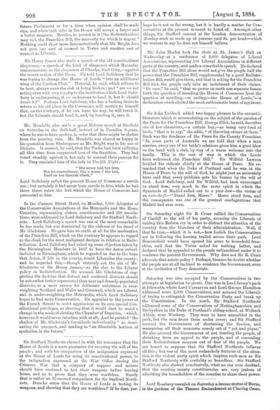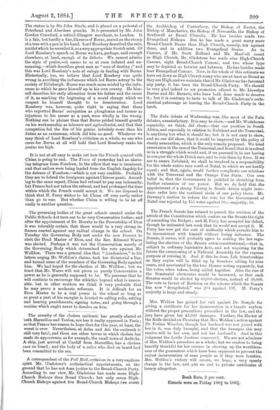Lord Rosebery unveiled onBaturday ahroxuse statue of Burns, in the
gardens of the Thames Embankment:at Charing Gress. Lord Rosebery unveiled onBaturday ahroxuse statue of Burns, in the gardens of the Thames Embankment:at Charing Gress.
The statue is by Sir John Steele, and is placed on a pedestal of Peterhead and Aberdeen granite. It is presented by Mr. John Gordon Crawford, a retired Glasgow merchant, to London. It is a fair, but hardly a fine, likeness of Burns, seated on the stump of a tree with a pen in his hand. Lord Rosebery described the rain, amidst which he unveiled it, as a very appropriate Scotch mist. Of Lord Rosebery's speech on Burns we have, perhaps, said enough elsewhere, at least, enough of its defects. We cannot admire the style of praise,—it seems to us at once inflated and un- meaning,—which describes great men as "men of destiny ;" and this was Lord Rosebery's note of eulogy in dealing with Burns. Historically, too, we believe that Lord Rosebery was quite wrong in ascribing the influences which led Burns astray to the society of Edinburgh. Burns was much more misled by the influ- ences to which he gave himself up in his own county. He him- self describes his early alienation from his father and the cause of it, as marking the beginning of a moral change which we suspect he himself thought to be deterioration. Lord Rosebery was, however, quite right in saying that those who regretted Burns' occupation as ploughman and farmer as injurious to his career as a poet, were wholly in the wrong. Nothing can be plainer than that Burns prided himself greatly on his workmanship as labourer and agriculturist, and that that • occupation fed the fire of his genius infinitely more than his duties as an exciseman, which did him no good. Whatever we may think of Lord Rosebery's criticism as a whole, no one who cares for Burns at all will hold that Lord Rosebery ranks his genius too high.



































 Previous page
Previous page